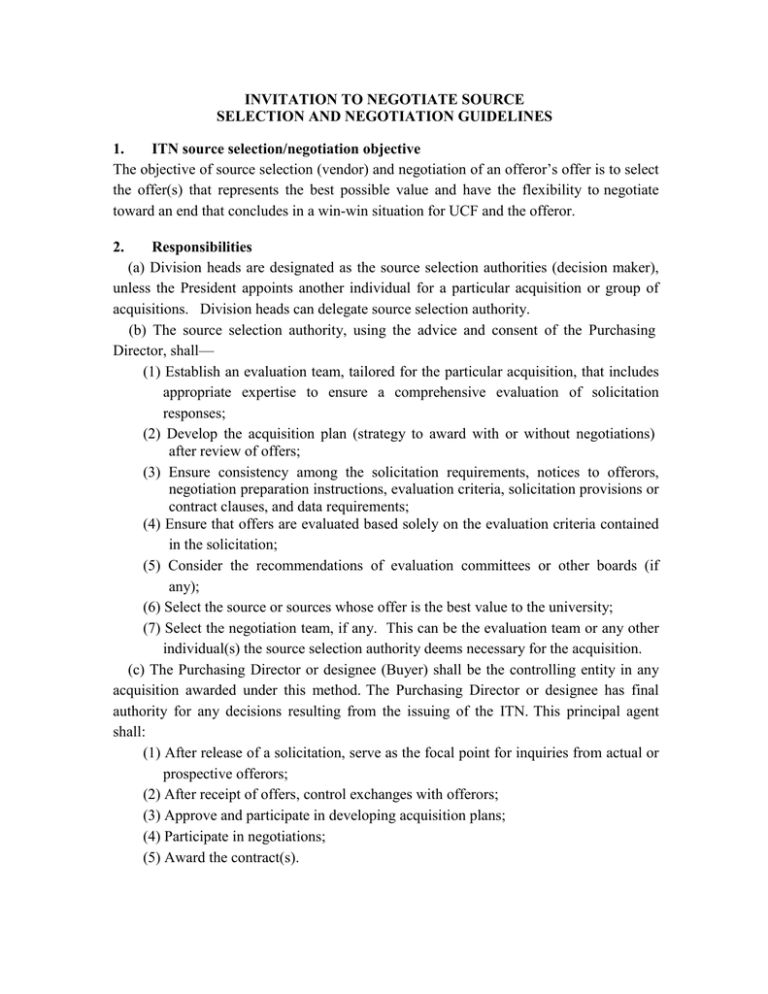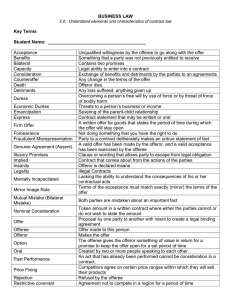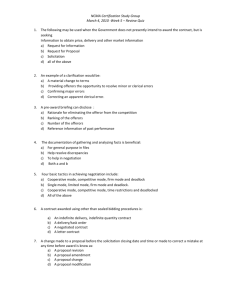REQUEST FOR PROPOSAL SOURCE SELECTION AND
advertisement

INVITATION TO NEGOTIATE SOURCE SELECTION AND NEGOTIATION GUIDELINES 1. ITN source selection/negotiation objective The objective of source selection (vendor) and negotiation of an offeror’s offer is to select the offer(s) that represents the best possible value and have the flexibility to negotiate toward an end that concludes in a win-win situation for UCF and the offeror. 2. Responsibilities (a) Division heads are designated as the source selection authorities (decision maker), unless the President appoints another individual for a particular acquisition or group of acquisitions. Division heads can delegate source selection authority. (b) The source selection authority, using the advice and consent of the Purchasing Director, shall— (1) Establish an evaluation team, tailored for the particular acquisition, that includes appropriate expertise to ensure a comprehensive evaluation of solicitation responses; (2) Develop the acquisition plan (strategy to award with or without negotiations) after review of offers; (3) Ensure consistency among the solicitation requirements, notices to offerors, negotiation preparation instructions, evaluation criteria, solicitation provisions or contract clauses, and data requirements; (4) Ensure that offers are evaluated based solely on the evaluation criteria contained in the solicitation; (5) Consider the recommendations of evaluation committees or other boards (if any); (6) Select the source or sources whose offer is the best value to the university; (7) Select the negotiation team, if any. This can be the evaluation team or any other individual(s) the source selection authority deems necessary for the acquisition. (c) The Purchasing Director or designee (Buyer) shall be the controlling entity in any acquisition awarded under this method. The Purchasing Director or designee has final authority for any decisions resulting from the issuing of the ITN. This principal agent shall: (1) After release of a solicitation, serve as the focal point for inquiries from actual or prospective offerors; (2) After receipt of offers, control exchanges with offerors; (3) Approve and participate in developing acquisition plans; (4) Participate in negotiations; (5) Award the contract(s). 3. Evaluation Criteria. (a) The award decision is based on evaluation criteria that are tailored to the acquisition. (b) Evaluation criteria must— (1) Represent the key areas of importance and emphasis to be considered in the source selection decision; and (2) Support meaningful comparison and discrimination between and among competing offers. (c) The evaluation criteria that apply to an acquisition and their relative importance are within the broad discretion of UCF acquisition officials, subject to the following requirements: (1) Price or cost to the university shall be evaluated in every source selection; (2) The quality of the product or service shall be addressed in every source selection through consideration of one or more non-cost evaluation factors such as past performance, compliance with solicitation requirements, technical excellence, management capability, personnel qualifications, and/or prior experience. (d) All evaluation criteria that will affect contract award and their relative importance shall be stated clearly in the solicitation. (e) The rating method shall be disclosed in the solicitation (points allotted each criteria) and used to assign weight for ranking each negotiation. 4. Offer evaluation. Offer evaluation is an assessment of the negotiation and the negotiator’s ability to perform the prospective contract successfully. UCF shall evaluate competitive offers and then assess their relative qualities solely on the evaluation criteria specified in the solicitation. (a) Cost or price evaluation. Normally, competition establishes price reasonableness. Therefore, comparison of the negotiated prices will usually satisfy the requirement. (b) Past performance evaluation. (1) Past performance information is one indicator of an offeror’s ability to perform the contract successfully. The currency and relevance of the information, source of the information, context of the data, and general trends in contractor’s performance shall be considered. (2) The evaluation should take into account past performance information regarding predecessor companies, key personnel who have relevant experience or subcontractors that will perform major or critical aspects of the requirement when such information is relevant to the instant acquisition. (3) In the case of a negotiator without a record of relevant past performance or for whom information on past performance is not available, the offeror may not be evaluated favorably or unfavorably on past performance. 5. Clarifications and discussions prior to award or negotiations. (a) May be conducted to enhance UCF’s understanding of submitted offers; allow reasonable interpretation of the offer; or facilitate UCF’s evaluation process. Such communications shall not be used to cure offer deficiencies or material omissions, materially alter the technical or cost elements of the negotiation, and/or otherwise revise the offer. Such communications may be considered in ranking offers. (b) Are for the purpose of addressing issues that must be explored to determine whether an offer should be placed in the negotiable range. Such communications shall not provide an opportunity for the offeror to revise its proposal, but may address— (1) Ambiguities in the offer or other concerns (e.g., perceived deficiencies, weaknesses, errors, omissions, or mistakes; and (2) Information relating to relevant past performance. (c) Shall address adverse past performance information to which the offeror has not previously had an opportunity to comment. 6. Establishing the competitive range (negotiable vendor pool) (a) Evaluation committee shall evaluate and rank all offers. Based on the ratings of each offer against all evaluation criteria, the source selector shall establish a competitive range comprised of the most highly rated offer(s). (b) After evaluating all offers the source selector may determine that the number of most highly rated offers that might otherwise be included in the competitive range exceeds the number at which an efficient competition can be conducted. The source selector has authority to limit the number of offers in the competitive range to one (1) or to the greatest number that will permit an efficient competition among the most highly rated offers. (c) Offerors may be requested to make presentations or provide additional information. (d) If the source selector decides that an offeror’s offer should no longer be included in the competitive range, the offer shall be eliminated from consideration for award. Written notice of this decision shall be provided to unsuccessful offerors at the Purchasing Director’s discretion. 7. Pre-negotiation objectives. The pre-negotiation objectives establish the university’s initial negotiation position. Negotiations shall not be conducted for the sake of negotiation or to query whether the offeror will revise his/her negotiation to the benefit of the university without the university making a concession. The source selector shall establish pre-negotiation objectives before the negotiation of any pricing action. The scope and depth of the analysis supporting the objectives shall be directly related to the dollar value, importance, and complexity of the pricing action. When negotiating with only one offeror, the university’s analysis will be helpful in the Purchasing Director’s determination of fair and reasonable price. 8. Exchanges with offerors after establishment of the competitive range Negotiations are exchanges between the university and offerors that are undertaken with the intent of allowing the negotiator to revise its offer. These negotiations may include bargaining. Bargaining includes persuasion, alteration of assumptions and positions, giveand-take, and may apply to price, schedule, technical requirements, type of contract, or other terms of a proposed contract. When negotiations are conducted in a competitive acquisition, they take place after establishment of the competitive range. (a) The primary objective of negotiations is to maximize the university’s ability to obtain best value, based on the requirement and the evaluation criteria set forth in the solicitation. (b) Negotiations are tailored to each offeror’s offer, and must be conducted by the negotiating team with each offeror within the competitive range. (c) At a minimum, the negotiating team must, indicate to, or discuss with, each offeror still being considered for award, their deficiencies, significant weaknesses, and adverse past performance information to which the offeror has not yet had an opportunity to respond. The negotiating team also is encouraged to discuss other aspects of the offeror’s offer that could, in the opinion of the source selector, be altered or explained to enhance materially the offer’s potential for award. However, the source selector is not required to discuss every area where the offer could be improved. The scope and extent of discussions are a matter of the source selector and Purchasing Director’s judgment. (d) The University reserves the right to negotiate concurrently or separately with competing offerors. The University reserves the right to accept portions of a competing offeror’s reply and merge such portions into one project, including contracting with the entities offering such portions. (e) If, after discussions have begun, an offeror originally in the competitive range is no longer considered to be among the most highly rated offerors being considered for award, that offeror may be eliminated from the competitive range whether or not all material aspects of the offer have been discussed, or whether or not the offeror has been afforded an opportunity to submit a revised offer. (f) Limits on exchanges: Accept as provided in State and university rules, University personnel involved in the acquisition shall not engage in conduct that: (1) Favors one offeror over another; (2) Reveals an offeror’s technical solution, including unique technology, innovative and unique uses of commercial items, or any information that would compromise an offeror’s intellectual property to another offeror; (3) Reveals an offeror’s price without that offeror’s permission. However, the source selector may inform an offeror that its price is considered by the university to be too high, or too low, and reveal the results of the analysis supporting that conclusion; or (4) Reveal the names of individuals providing reference information about an offeror’s past performance. 9. Negotiation revisions. (a) If an offeror’s offer is eliminated or otherwise removed from the competitive range, no further revisions to that offeror’s offer shall be accepted or considered. The Purchasing Director, if he chooses to do so, should promptly notify offerors in writing when their offers are excluded from the competitive range or otherwise eliminated from the competition. The notice should state the basis for the determination and that a revised offer will not be considered. (b) The source selector may request or allow revised offers to clarify and document understandings reached during negotiations. At the conclusion of negotiations, each offeror still in the competitive range shall be given an opportunity to submit a final revised offer. The source selector is required to establish a common cut-off date only for receipt of final revised offers. Requests for final revised offers shall advise offerors that the final revised offer shall be in writing and that the university intends to make award without obtaining further revisions. 10. Documenting the negotiation. The source selector shall document the principal elements of the negotiated agreement. The documentation shall include but is not limited to the following: (1) The purpose of the negotiation. (2) A description of the acquisition, including appropriate identifying numbers (e.g., ITN No.). (3) The name, position, and organization of each person representing the contractor and the university in the negotiation. (4) A summary of how the final offer differs from the offeror’s original offer and the university’s objective. (5) A determination of how the revised offer is equal or more beneficial to the university than the original offer. 11. Award to successful negotiator. The Purchasing Director shall award a contract to the successful offeror by furnishing the executed contract or other notice of award to that offeror.




